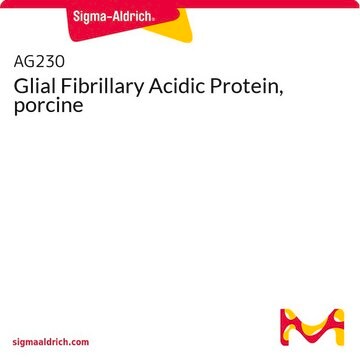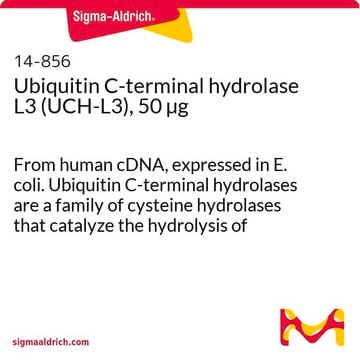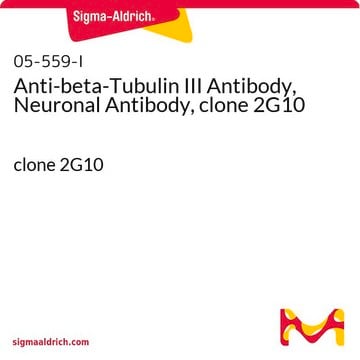14-855
Ubiquitin C-terminal hydrolase L1 (UCH-L1), 50 µg
From human cDNA, expressed in E. coli. Ubiquitin C-terminal hydrolases are a family of cysteine hydrolases that catalyze the hydrolysis of amides, esters & thioesters of the C-terminus of ubiquitin.
Se connecterpour consulter vos tarifs contractuels et ceux de votre entreprise/organisme
About This Item
Code UNSPSC :
12352200
eCl@ss :
32160405
Nomenclature NACRES :
NA.32
Produits recommandés
Source biologique
human
Niveau de qualité
Produit recombinant
expressed in E. coli
Activité spécifique
>1000 pmol/min-μg, 25 °C (with 1 μM ubiquitin-AMC as substrate and UCH-L1 at 20 pM (0.54 ng/mL).)
Poids mol.
Mw 24.8 kDa
Fabricant/nom de marque
Upstate®
Numéro d'accès NCBI
Numéro d'accès UniProt
Conditions d'expédition
dry ice
Description générale
Produced from human cDNA, expressed in E. coli. Ubiquitin C-terminal hydrolases (UCHs) are a family of cysteine hydrolases that catalyze the hydrolysis of amides, esters and thioesters of the C-terminus of ubiquitin. Mammalian neuronal cells abundantly express a deubiquitylating enzyme, ubiquitin carboxy-terminal hydrolase 1 (UCH-L1). Mutations in UCH-L1 are linked to Parkinson′s disease as well as gracile axonal dystrophy (gad) in mice. In contrast to the universally expressed UCH-L3 isozyme, UCH-L1 is expressed exclusively in neurons and testis/ovary. It has been shown that UCH-L1 associates and co-localizes with monoubiquitin and elongates ubiquitin half-life and the suggestion is made that UCH-L1, with avidity and affinity for ubiquitin, ensures ubiquitin stability within neurons.
Product Source: Recombinant human UCH-L1 expressed in E. coli
Stockage et stabilité
As supplied, store at -80°C for up to 12 months from date of receipt. Avoid repeated freeze/thaw cycles. After initial defrost, aliquot (for extended storage it is recommended that aliquots be no smaller then 10 μL) and store at -80°C. Snap-freezing in a dry ice/ethanol bath or liquid nitrogen is recommended. As supplied, the enzyme is stable on ice for several hours.
Informations légales
UPSTATE is a registered trademark of Merck KGaA, Darmstadt, Germany
Clause de non-responsabilité
Unless otherwise stated in our catalog or other company documentation accompanying the product(s), our products are intended for research use only and are not to be used for any other purpose, which includes but is not limited to, unauthorized commercial uses, in vitro diagnostic uses, ex vivo or in vivo therapeutic uses or any type of consumption or application to humans or animals.
Code de la classe de stockage
12 - Non Combustible Liquids
Classe de danger pour l'eau (WGK)
WGK 1
Point d'éclair (°F)
Not applicable
Point d'éclair (°C)
Not applicable
Certificats d'analyse (COA)
Recherchez un Certificats d'analyse (COA) en saisissant le numéro de lot du produit. Les numéros de lot figurent sur l'étiquette du produit après les mots "Lot" ou "Batch".
Déjà en possession de ce produit ?
Retrouvez la documentation relative aux produits que vous avez récemment achetés dans la Bibliothèque de documents.
I N Day et al.
FEBS letters, 210(2), 157-160 (1987-01-05)
The co-ordinate sequencing of the human neuronal and neuroendocrine marker protein PGP 9.5 and its cDNA is described. The cDNA encodes the complete protein (212 amino acids), and the 340 nucleotide 3'-noncoding region including the polyadenylation signal, indicating an mRNA
C N Larsen et al.
Biochemistry, 35(21), 6735-6744 (1996-05-28)
Ubiquitin C-terminal hydrolases (UCH's) are a newly-defined class of thiol proteases implicated in the proteolytic processing of polymeric ubiquitin. They are important for the generation of monomeric ubiquitin, the active component of the eukaryotic ubiquitin-dependent proteolytic system. There are at
I N Day et al.
The Biochemical journal, 268(2), 521-524 (1990-06-01)
Database search using a bovine thymus ubiquitin C-terminal hydrolase sequence indicated 54% sequence identity with the abundant human neuron-specific protein gene product 9.5 (PGP9.5), which was then shown to possess the same activity [Wilkinson, Lee, Deshpande, Duerksen-Hughes, Boss & Pohl
Yichin Liu et al.
Cell, 111(2), 209-218 (2002-11-01)
The assumption that each enzyme expresses a single enzymatic activity in vivo is challenged by the linkage of the neuronal enzyme ubiquitin C-terminal hydrolase-L1 (UCH-L1) to Parkinson's disease (PD). UCH-L1, especially those variants linked to higher susceptibility to PD, causes
Kinetic and mechanistic studies on the hydrolysis of ubiquitin C-terminal 7-amido-4-methylcoumarin by deubiquitinating enzymes.
Dang, L C, et al.
Biochemistry, 37, 1868-1879 (1998)
Notre équipe de scientifiques dispose d'une expérience dans tous les secteurs de la recherche, notamment en sciences de la vie, science des matériaux, synthèse chimique, chromatographie, analyse et dans de nombreux autres domaines..
Contacter notre Service technique








